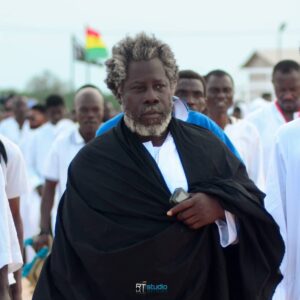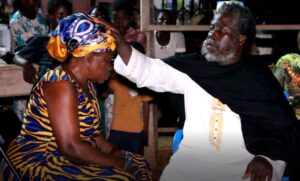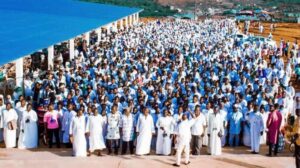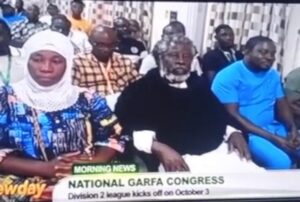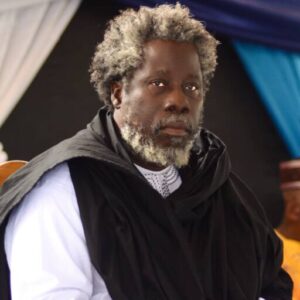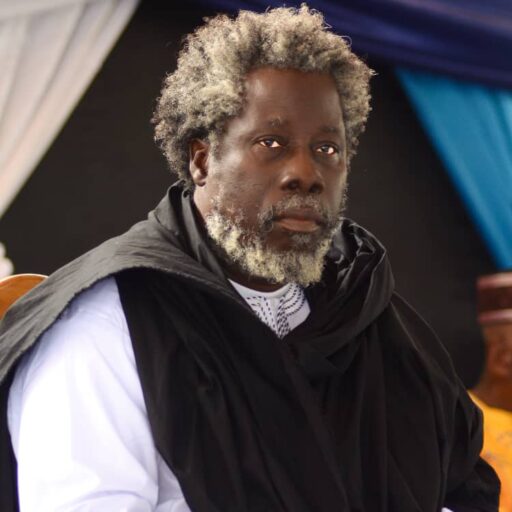
“I Did Not Test Abraham, I Punished Him! Says The Most High God”
Teachings of Okronkronyi Nyame Somafo Yawoh
Written by Mensah Adinkrah, Ph.D.
Introduction
Okronkronyi Nyame Somafo Yawoh challenges the widely held Christian belief that suffering, challenges, or setbacks are divine tests. According to his teachings, the notion that God tests individuals is a misconception. He asserts that God does not test humanity at all. Instead, events that might be interpreted as tests are acts of correction or punishment specifically targeted at God’s Messengers rather than ordinary people.
For instance, He cites the stories of Abraham, Jonah, and Job as examples where what may appear to be a test was actually divine punishment. Abraham, for instance, was commanded to sacrifice his son not to test his loyalty but as a punishment for having diverted his love toward Ishmael at the expense of God. Similarly, Jonah’s ordeal in the belly of the fish was not a test but a punishment for his disobedience to God’s directive to preach to Nineveh. Job’s suffering, too, is reframed in this theological perspective as punishment rather than a divine trial of faith.
Who is Okronkronyi Nyame Somafo Yawoh?
Okronkronyi Nyame Somafo Yawoh, is the prophesied Elijah and the End Time Messiah, the powerful spiritual figure foretold to descend during the final days to complete a divine mission on Earth. He has established the third and final religion of the Most High God, known as Asomdwee Ntonton Som, and has constructed the Third Holy Temple of God in Ekumfi Otuam, in the Central Region of Ghana. This is a location He asserts is the world’s physical and spiritual center. According to His teachings, the true name of the Most High God, the Creator of all things, is RABBI (Rah-bee).
Errors in Existing Scriptural Texts
Okronkronyi Nyame Somafo Yawoh asserts that existing scriptural texts contain inaccuracies, not due to errors by the prophets and messengers but due to the scribes and writers who recorded these messages. He teaches that He is the “Spirit of Truth” prophesied by Jesus in the Bible, tasked with clarifying these errors. In John 16:12-13, Jesus speaks of the coming of the Spirit of Truth who will lead followers into “all the truth” and convey the messages of God with full clarity: 12 “I have many more things to say to you, but you cannot bear [to hear] them now. 13 But when He, the Spirit of Truth, comes, He will guide you into all the truth [full and complete truth]. For He will not speak on His own initiative, but He will speak whatever He hears [from the Father—the message regarding the Son], and He will disclose to you what is to come [in the future].
Nyame Somafo Yawoh asserts that His mission includes revealing this complete truth and guiding humanity according to the original intentions of divine revelation, which He asserts were altered or misrepresented in existing scriptures. Through this mission, He aims to fulfill what He sees as a divine mandate: correcting these errors and presenting what He describes as an unaltered path to God for the followers of Asomdwee Ntonton Som.
God Asked Abraham to Sacrifice his son Ishmael (not Isaac) to Him
Okronkronyi Nyame Somafo Yawoh challenges the traditional Biblical account that God asked Abraham to sacrifice his son Isaac. He asserts that the story has been misinterpreted and that it was Ishmael, not Isaac, whom God commanded Abraham to offer as a sacrifice. According to Somafo Yawoh, Ishmael, born 14 years before Isaac, reached manhood at 21 years old, which was the culturally recognized age of adulthood at the time. When Ishmael became a man, God requested the sacrifice as an act of thanksgiving. At the time of this event, Okronkronyi Nyame Somafo Yawoh teaches, Isaac was only about seven years old and still considered a child. This distinction, He claims, has been overlooked or deliberately altered in existing scriptural texts, leading to widespread misunderstanding of the narrative. By correcting this account, Nyame Somafo Yawoh seeks to illuminate what he considers the true history of God’s dealings with humanity and rectify errors he attributes to the writers of the scriptures rather than their original Messengers. This reinterpretation reflects his broader mission of bringing what he describes as the “complete truth” as prophesied in John 16:12-13.
Biblical Texts About the Times of Ishmael and Isaac’s Births
Genesis 16:15 describes the birth of Ishmael when Abraham was 86-years old. “15 So Hagar bore Abram a son, and Abram gave the name Ishmael to the son she had borne. 16 Abram was eighty-six years old when Hagar bore him Ishmael. According to the Bible, Isaac was born to Abraham and Sarah when Abraham was a hundred years old. Genesis 21: 5 states 5 Abraham was a hundred years old when his son Isaac was born to him.
Abrahams Story of Sacrifice: Divine Punishment, not Divine Test
In the case of Abraham, Okronkronyi Nyame Somafo Yawoh explains that God’s instruction to Abraham to sacrifice his son was not a test of loyalty but a punishment. Before Ishmael’s birth, Abraham’s love and devotion to God were unparalleled. But after Ishmael was born, Abraham’s attention shifted, and he poured his love into his son, leaving little for God. God, perceiving this shift, commanded Abraham to make a painful sacrifice: to offer Ishmael as a burnt offering.
Obediently, Abraham prepared to carry out this challenging act. As he lifted his hand to sacrifice his son, a voice called out, instructing him to stop and sacrifice a ram instead, which had been placed nearby. According to Okronkronyi Nyame Somafo Yawoh, God intended this moment as a punishment and a reminder to Abraham of his duty to place God above all else, even his beloved son. The directive was not a test but punishment, a way to reestablish Abraham’s devotion.
Conclusion
In conclusion, Okronkronyi Nyame Somafo Yawoh’s reinterpretation of the Abrahamic narrative underscores his broader mission of revealing what he identifies as the unadulterated truth of God’s word. By asserting that Ishmael, not Isaac, was the son intended for sacrifice, he challenges conventional interpretations of scripture and invites believers to reconsider long-held beliefs. This reinterpretation, rooted in his teachings as the Spirit of Truth, emphasizes the importance of revisiting spiritual texts with discernment and seeking deeper understanding of divine intentions. For Somafo Yawoh, this correction is not merely an academic exercise but a fulfillment of his divine calling to guide humanity towards a fuller comprehension of God’s will as prophesied in scripture.

